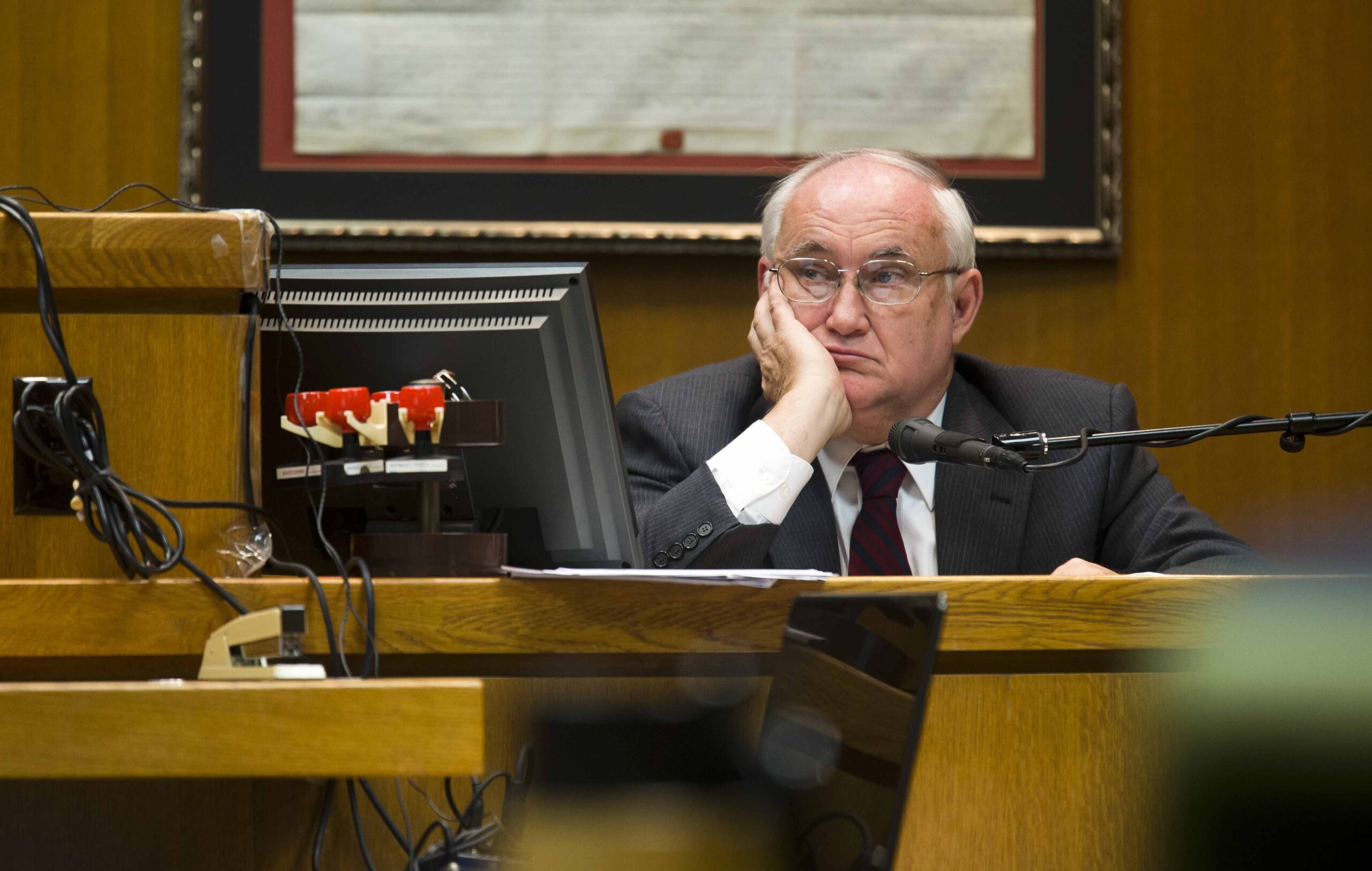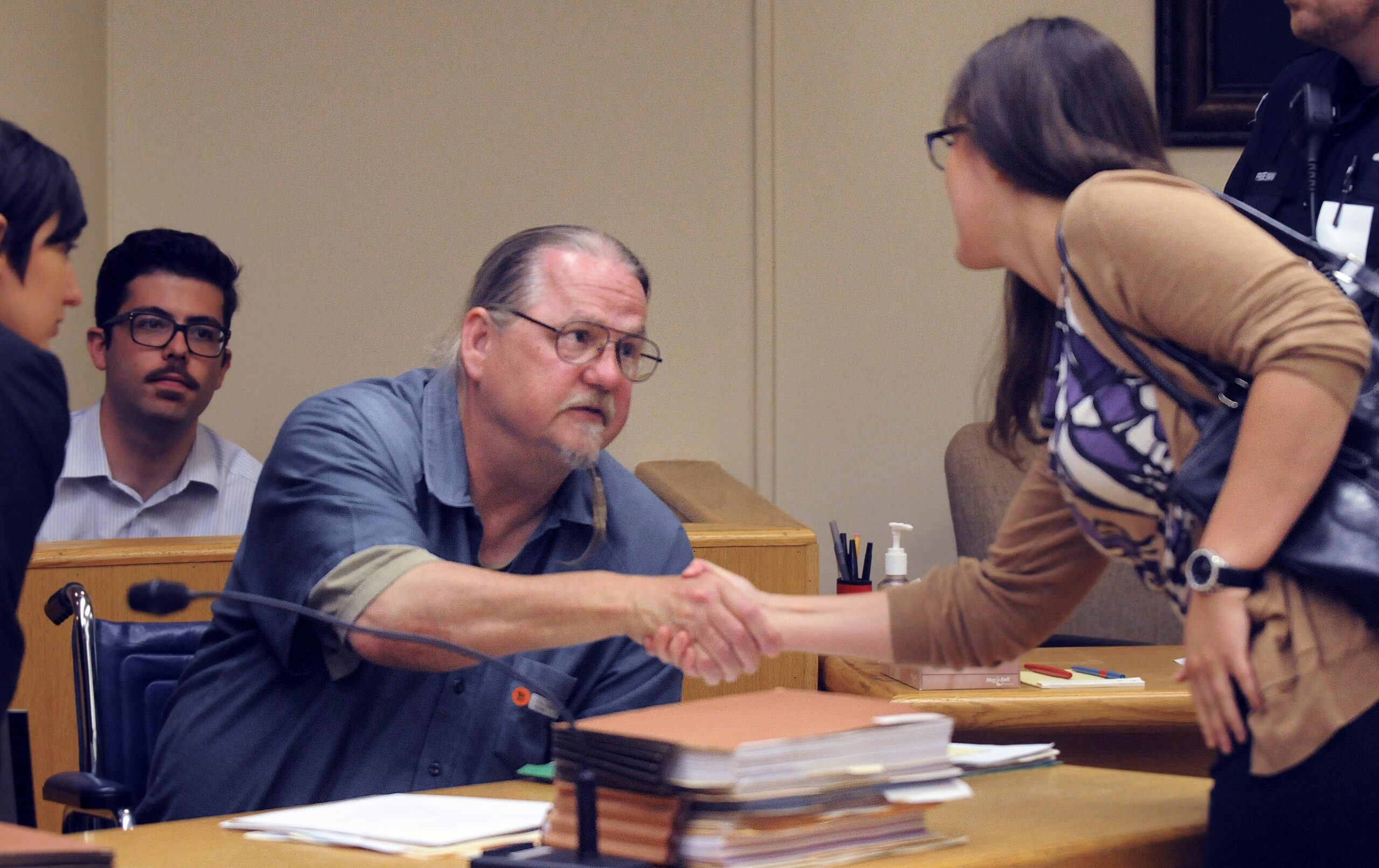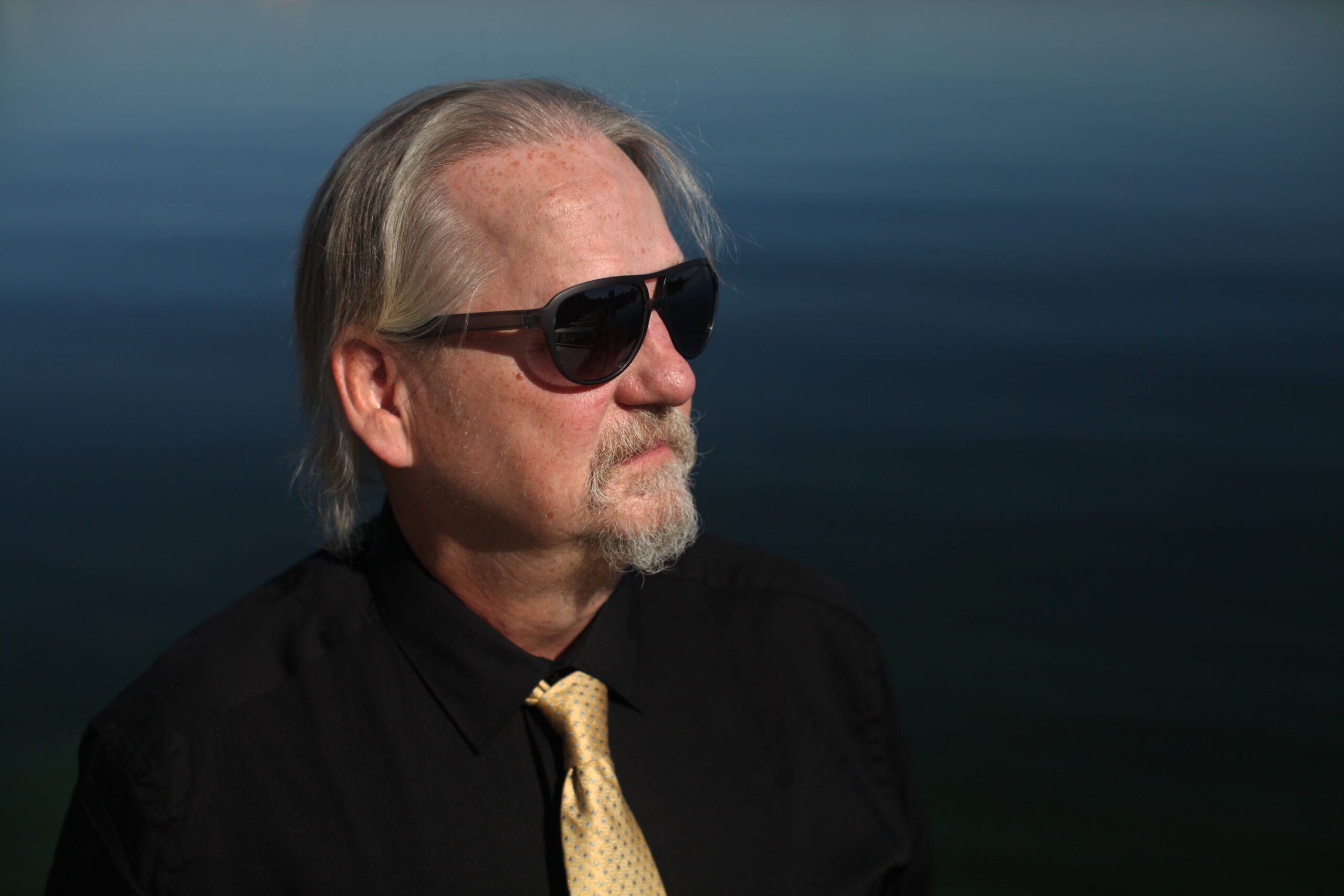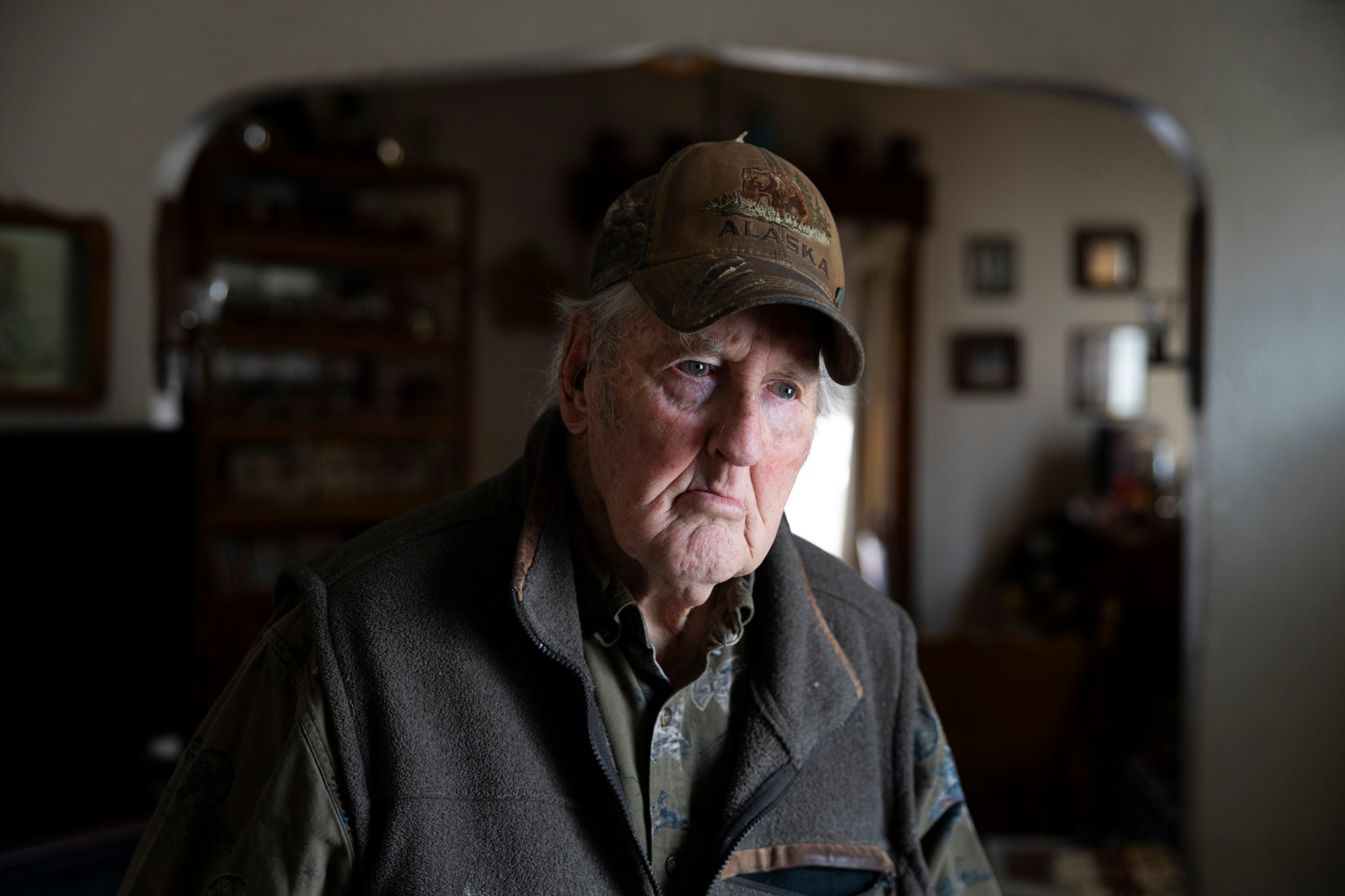When Outagamie County District Attorney Vince Biskupic was running for office back in 2002, he listed some of his biggest cases on his campaign website.
“Vince Biskupic has successfully prosecuted more than 30 homicide or attempted homicide cases in Wisconsin,” the now-dormant website declared.
Biskupic said he had gone after murderers, predators, drug dealers — even “deadbeat parents.” And yet, a Wisconsin Watch and WPR investigation found, two of the defendants on Biskupic’s campaign website later had their convictions overturned. In two other cases, questions linger about whether Biskupic acted properly in prosecuting them.[[{“fid”:”1710571″,”view_mode”:”embed_portrait”,”fields”:{“format”:”embed_portrait”,”alignment”:”right”,”field_image_caption[und][0][value]”:”%3Cp%3EVince%20Biskupic%2C%20Outagamie%20County%20district%20attorney%20and%20Republican%20candidate%20for%20attorney%20general%2C%20speaks%20with%20reporters%20and%20editors%20from%20the%20Appleton%20Post-Crescent%20in%20September%202002.%20Biskupic%20ran%20for%20office%20on%20his%20track%20record%20as%20a%20prosecutor%20%E2%80%94%20but%20several%20of%20those%20cases%20had%20significant%20flaws%2C%20a%20Wisconsin%20Watch%20and%20WPR%20investigation%20showed.%20%3Cem%3EKristyna%20Wentz-Graff%20%2F%20Appleton%20Post-Crescent%3C%2Fem%3E%3C%2Fp%3E%0A”,”field_image_caption[und][0][format]”:”full_html”,”field_file_image_alt_text[und][0][value]”:”Vince Biskupic”,”field_file_image_title_text[und][0][value]”:”Open and Shut episode 6″},”type”:”media”,”field_deltas”:{“5”:{“format”:”embed_portrait”,”alignment”:”right”,”field_image_caption[und][0][value]”:”%3Cp%3EVince%20Biskupic%2C%20Outagamie%20County%20district%20attorney%20and%20Republican%20candidate%20for%20attorney%20general%2C%20speaks%20with%20reporters%20and%20editors%20from%20the%20Appleton%20Post-Crescent%20in%20September%202002.%20Biskupic%20ran%20for%20office%20on%20his%20track%20record%20as%20a%20prosecutor%20%E2%80%94%20but%20several%20of%20those%20cases%20had%20significant%20flaws%2C%20a%20Wisconsin%20Watch%20and%20WPR%20investigation%20showed.%20%3Cem%3EKristyna%20Wentz-Graff%20%2F%20Appleton%20Post-Crescent%3C%2Fem%3E%3C%2Fp%3E%0A”,”field_image_caption[und][0][format]”:”full_html”,”field_file_image_alt_text[und][0][value]”:”Vince Biskupic”,”field_file_image_title_text[und][0][value]”:”Open and Shut episode 6″}},”link_text”:false,”attributes”:{“alt”:”Vince Biskupic”,”title”:”Open and Shut episode 6″,”class”:”media-element file-embed-portrait media-wysiwyg-align-right”,”data-delta”:”5″}}]]
And there was one notable case Biskupic left off the list: The prosecution of Greg Kortz, convicted in the death of a police officer’s son in a road rage incident.
Mike Balskus was working for Biskupic as an assistant district attorney in Outagamie County in December 1995 when the office filed charges against Kortz, a 17-year-old high school senior.
According to the criminal complaint, the day before Thanksgiving, Kortz and his friends were driving on the highway, and someone in Kortz’s car flashed the middle finger at another group of young men in a pickup truck.
The pickup truck followed Kortz and his friends off the highway for about five miles, all the way to Kortz’s house. Some of the boys in the pickup truck got out and confronted the boys in Kortz’s car. A fight broke out
“And this Kortz guy hits a guy over the head with a baseball bat,” Balskus recalls.
The victim was Kevin Nechodom, 20, the son of a local police officer. Nechodom was taken to the hospital. Sheriff’s deputies took statements from witnesses. Balskus said it seemed like a battery case. But three days later, Nechodom died of head trauma, and the Outagamie County’s Sheriff’s Office went out again to investigate.
‘Serious’ matter emerges
About two months after Nechodom’s death, during Kortz’s arraignment, his attorney, Mary Lou Robinson, brought up something she called “serious.” Robinson said she had “strong reason to believe” that Biskupic directed police officers to rewrite reports. She said Biskupic had told her there may have been some “typos.”
Robinson asked for the original police reports, but she never got them. They had been destroyed.
The incident began when the sheriff’s office went back to re-interview the witnesses, and one of them denied saying something attributed to him in the original report.
So, recalls Balskus, a group of deputies got together.
“They go to Vince, and they say, ‘Oh, usually what we do is we do a supplement. You know, officer so-and-so went out, talked to this guy. He denies making this statement. He says this is what happened, blah blah blah.’ That’s normal procedure,” Balskus says. “Vince says, ‘No. What I want you to do is collect all of the police reports (and) destroy them.’”
The reason for the standard procedure is so police, judges and juries can see if a witness’s story changes over time, which could raise questions about credibility.
One of the deputies in that meeting, retired Outagamie County Sheriff’s Sgt. Michael Heisler, says in an interview with Wisconsin Watch that he couldn’t remember all of the details. But he remembers some important ones.
Heisler says destroying the report was ultimately his decision. But he says it was Biskupic — who was leading the prosecution — who first suggested it.
Biskupic pulled from case
Three months after ’s attorney first raised this issue, Outagamie County Circuit Judge John Des Jardins held a hearing to get to the bottom of it. Biskupic didn’t appear at this hearing himself. He sent Balskus.
Heisler told the judge he’d never done something like this in his 21 years in law enforcement. Kortz’s attorney asked him whose idea it was. Whenever she tried to pin it on Biskupic, Balskus objected.[[{“fid”:”1710581″,”view_mode”:”embed_landscape”,”fields”:{“format”:”embed_landscape”,”alignment”:”right”,”field_image_caption[und][0][value]”:”%3Cp%3EAn%20article%20in%20the%20Dec.%205%2C%201995%20edition%20of%20the%20Appleton%20Post-Crescent%20shows%20defendant%20Greg%20Kortz%20sitting%20with%20his%20attorney%20Mary%20Lou%20Robinson%20in%20Outagamie%20County%20Circuit%20Court.%20Kortz%20was%20found%20guilty%20of%20second-degree%20reckless%20homicide%20and%20sentenced%20to%2013%20years%20in%20prison.%20Outagamie%20County%20District%20Attorney%20Vince%20Biskupic%20was%20removed%20from%20the%20case%20before%20trial%2C%20after%20it%20was%20discovered%20that%20the%20prosecutor%20knew%20initial%20sheriff%E2%80%99s%20reports%20about%20the%20incident%20had%20been%20destroyed%20and%20rewritten.%20%3Cem%3EPhoto%20courtesy%20Appleton%20Post-Crescent%20via%20Newspapers.com%3C%2Fem%3E%3C%2Fp%3E%0A”,”field_image_caption[und][0][format]”:”full_html”,”field_file_image_alt_text[und][0][value]”:”An article in the Dec. 5, 1995 edition of the Appleton Post-Crescent shows defendant Greg Kortz sitting with his attorney Mary Lou Robinson in Outagamie County Circuit Court. Kortz was found guilty of second-degree reckless homicide and sentenced to 13 ye”,”field_file_image_title_text[und][0][value]”:”Open and Shut episode 6″},”type”:”media”,”field_deltas”:{“7”:{“format”:”embed_landscape”,”alignment”:”right”,”field_image_caption[und][0][value]”:”%3Cp%3EAn%20article%20in%20the%20Dec.%205%2C%201995%20edition%20of%20the%20Appleton%20Post-Crescent%20shows%20defendant%20Greg%20Kortz%20sitting%20with%20his%20attorney%20Mary%20Lou%20Robinson%20in%20Outagamie%20County%20Circuit%20Court.%20Kortz%20was%20found%20guilty%20of%20second-degree%20reckless%20homicide%20and%20sentenced%20to%2013%20years%20in%20prison.%20Outagamie%20County%20District%20Attorney%20Vince%20Biskupic%20was%20removed%20from%20the%20case%20before%20trial%2C%20after%20it%20was%20discovered%20that%20the%20prosecutor%20knew%20initial%20sheriff%E2%80%99s%20reports%20about%20the%20incident%20had%20been%20destroyed%20and%20rewritten.%20%3Cem%3EPhoto%20courtesy%20Appleton%20Post-Crescent%20via%20Newspapers.com%3C%2Fem%3E%3C%2Fp%3E%0A”,”field_image_caption[und][0][format]”:”full_html”,”field_file_image_alt_text[und][0][value]”:”An article in the Dec. 5, 1995 edition of the Appleton Post-Crescent shows defendant Greg Kortz sitting with his attorney Mary Lou Robinson in Outagamie County Circuit Court. Kortz was found guilty of second-degree reckless homicide and sentenced to 13 ye”,”field_file_image_title_text[und][0][value]”:”Open and Shut episode 6″}},”link_text”:false,”attributes”:{“alt”:”An article in the Dec. 5, 1995 edition of the Appleton Post-Crescent shows defendant Greg Kortz sitting with his attorney Mary Lou Robinson in Outagamie County Circuit Court. Kortz was found guilty of second-degree reckless homicide and sentenced to 13 ye”,”title”:”Open and Shut episode 6″,”class”:”media-element file-embed-landscape media-wysiwyg-align-right”,”data-delta”:”7″}}]]
At the time, Balskus says, he didn’t believe it was relevant. And, he says, he didn’t exactly care for Robinson.
About a month later, Des Jardins held another hearing. This time, Biskupic appeared.
Heisler never told the court that Biskupic was the one who first suggested destroying the original report. But the judge noted that as the prosecutor, Biskupic had the “responsibility … to preserve the report so that it would not be changed and destroyed.”
Des Jardins “reluctantly” took Biskupic’s office off the case, saying he did not want the prosecutor to be called as a witness in a trial he was handling. A prosecutor from another county was appointed to handle it, and in October 1996, a jury found Kortz guilty of second-degree reckless homicide. He was sentenced to 13 years in prison.
Kortz declined an interview.
Agency polices prosecutors
Prosecutors like Biskupic have absolute immunity for their actions in the courtroom and while preparing a case for trial, so it’s nearly impossible to sue them. But there is a place for parties to raise concerns about prosecutors: the Office of Lawyer Regulation, an arm of the Wisconsin Supreme Court.
The agency is charged with investigating complaints to determine whether an attorney has committed an ethical violation and, if so, it merits a disciplinary proceeding or just a cautionary letter.
Even if a lawyer has engaged in misconduct, the matter may be handled by a private or public reprimand or “diversion” — such as reducing the fees owed by a client or continuing legal education.
But if the lawyer doesn’t agree with OLR’s recommendations — or if there’s enough cause to suspend or revoke a lawyer’s license — OLR can conduct a formal investigation. Only the most serious or disputed cases become public when they are filed with the Supreme Court.
For the most part, attorney Gregg Herman, who sometimes works as retained counsel for OLR, believes this system works. But there are exceptions, Herman said. One case he handled a few years ago remains a “sore spot.”
Planted evidence prompts complaint
In 2014, Robert Zapf was the district attorney of Kenosha County, in southeast Wisconsin, when the Kenosha police department investigated a fatal robbery.
“One of the defendants is arrested, and while he’s being booked, a police officer takes his ID card and pockets it rather than processing it as evidence,” Herman recounts. “Subsequently, I don’t know if it’s the the next day or so, there was a search warrant executed on … the other defendant’s home. And in the process of the search warrant, the police officer plants the ID and plants a bullet.”
The bullet and the ID didn’t improve the strength of the state’s case. Police had already identified the defendants — and the bullet wasn’t even the right caliber. Kenosha Police officer Kyle Baars resigned and eventually was convicted of misconduct in office.
Zapf turned over discovery information to the defense, including a one-page police report that alluded to the planted evidence.
“But it’s one piece among other discovery. It’s sort of hidden in there,” Herman recalls. “You really have to know what it meant.”
During the trial, a police officer testified about the planted evidence.
“And all of a sudden, the defense attorney goes, ‘Oh my, wha — what?’ The judge halts the proceedings … sends the jury out. There’s this, essentially like emergency hearing, and the judge decides it’s not Brady evidence (and) we can continue with the trial,” Herman says.
The ‘Brady rule,’ from the U.S. Supreme Court case, Brady v. Maryland, requires prosecutors to turn over exculpatory evidence — that which supports a person’s innocence. The circuit court judge in the trial said this evidence wasn’t exculpatory.
“But,” says Herman, “was it relevant in terms of proving police misconduct? Which could then lead to other discoverable evidence, and maybe there was other police misconduct?”
Prosecutor faced suspension — then cleared
In Wisconsin, prosecutors are not required to turn over all relevant evidence. But while the trial judge didn’t find that Zapf committed a Brady violation, OLR believed he did.
The Wisconsin Supreme Court appointed a referee, who agreed Zapf had committed misconduct. He recommended that he be suspended from the practice of law and prohibited from ever serving as a prosecutor again in Wisconsin.
Zapf appealed the decision, arguing he was being held to a higher standard than required under Wisconsin’s discovery statute. The state Supreme Court agreed.
Even today, Herman has trouble talking about it without getting angry.
“I think prosecutors should provide all information that is in the least bit relevant to the defense,” Herman says. “And it’s not a matter of the defense asking for it. And I don’t think it’s a job of a prosecutor to determine how relevant it is. But, as I said, apparently the Wisconsin Supreme Court didn’t see it that way.”
OLR has never publicly reprimanded Biskupic. But because so much of the system is confidential, it’s unknown whether OLR ever gave him a private reprimand or a warning or put him through diversion.
Lack of discovery ‘pernicious’
Arizona State University law professor Valeena Beety calls withholding evidence “one of the most pernicious problems leading to wrongful convictions and really undermining the integrity of our criminal justice system overall.”
Some states have recognized the problem and adopted stricter standards requiring prosecutors to share more evidence.
Texas beefed up its discovery laws after Michael Morton was wrongfully convicted of murdering his wife in their bed. Prosecutor Ken Anderson claimed Morton had beaten his wife to death because she wouldn’t have sex with him on his birthday. Morton was convicted and sentenced to life in prison.

But Anderson didn’t tell the whole story.
“(Morton’s) young son made exculpatory statements. There was evidence of another man being there and in the neighborhood,” Beety says. “But the prosecutor suppressed that evidence — didn’t disclose it, intentionally.”
Twenty-five years later, DNA evidence exonerated Morton and identified another man — one who had been convicted of beating another woman to death in her bed. After his exoneration, Morton lobbied the Texas Legislature to change the law.
Wrongful conviction sparks reform
In 2013, Texas lawmakers passed the Michael Morton Act, which Beety says generally requires prosecutors to share their files with the defense — even before they offer a deal to admit guilt in exchange for a lighter sentence. That means defense attorneys have access to all the evidence — not just what the prosecutor chooses to give them.
Beety wonders whether the fact that Morton is white played a factor in lawmakers’ decision to overhaul Texas’ discovery law.
“I think it mattered for the legislators to see a straight white man who had, you know, a loving, long-term relationship with his wife, had kids. And then he went through this situation of being wrongfully convicted,” Beety says.
Morton’s exoneration — and Anderson’s role in his wrongful conviction — got a lot of attention.
The Texas Supreme Court ordered a court of inquiry to determine whether Anderson had committed any crimes. In 2013, he pleaded guilty to criminal contempt of court. According to the Innocence Project, Anderson was the first prosecutor ever jailed for misconduct leading to a wrongful conviction.
Michael Morton had spent 25 years in prison for a crime he did not commit. But when it came time to sentence the man who put him there, “He got 10 days,” Beety says.
That was later knocked down to five days — for “good behavior.”
[[{“fid”:”1710566″,”view_mode”:”full_width”,”fields”:{“format”:”full_width”,”alignment”:””,”field_image_caption[und][0][value]”:”%3Cp%3EMichael%20Morton%2C%20right%2C%20reacts%20after%20leaving%20the%20Williamson%20County%20courthouse%20in%20Taylor%2C%20Texas%20with%20his%20attorney%20John%20W.%20Raley%2C%20on%20Oct.%204%2C%202011.%20Morton%20was%20freed%20from%20a%20life%20sentence%20after%20DNA%20tests%20linked%20his%20wife%E2%80%99s%20murder%20to%20another%20man.%20The%20prosecutor%2C%20Ken%20Anderson%2C%20later%20pled%20guilty%20to%20criminal%20contempt%20of%20court%20for%20concealing%20exculpatory%20information%20from%20Mr.%20Morton%E2%80%99s%20defense%20team%20and%20the%20trial%20judge.%20Ricardo%20B.%20%3Cem%3EBrazziell%2FAustin%20American-Statesman%20via%20AP%3C%2Fem%3E%3C%2Fp%3E%0A”,”field_image_caption[und][0][format]”:”full_html”,”field_file_image_alt_text[und][0][value]”:”Michael Morton and his attorney walk out of a courthouse “,”field_file_image_title_text[und][0][value]”:”Open and Shut episode 6″},”type”:”media”,”field_deltas”:{“4”:{“format”:”full_width”,”alignment”:””,”field_image_caption[und][0][value]”:”%3Cp%3EMichael%20Morton%2C%20right%2C%20reacts%20after%20leaving%20the%20Williamson%20County%20courthouse%20in%20Taylor%2C%20Texas%20with%20his%20attorney%20John%20W.%20Raley%2C%20on%20Oct.%204%2C%202011.%20Morton%20was%20freed%20from%20a%20life%20sentence%20after%20DNA%20tests%20linked%20his%20wife%E2%80%99s%20murder%20to%20another%20man.%20The%20prosecutor%2C%20Ken%20Anderson%2C%20later%20pled%20guilty%20to%20criminal%20contempt%20of%20court%20for%20concealing%20exculpatory%20information%20from%20Mr.%20Morton%E2%80%99s%20defense%20team%20and%20the%20trial%20judge.%20Ricardo%20B.%20%3Cem%3EBrazziell%2FAustin%20American-Statesman%20via%20AP%3C%2Fem%3E%3C%2Fp%3E%0A”,”field_image_caption[und][0][format]”:”full_html”,”field_file_image_alt_text[und][0][value]”:”Michael Morton and his attorney walk out of a courthouse “,”field_file_image_title_text[und][0][value]”:”Open and Shut episode 6″}},”link_text”:false,”attributes”:{“alt”:”Michael Morton and his attorney walk out of a courthouse “,”title”:”Open and Shut episode 6″,”class”:”media-element file-full-width”,”data-delta”:”4″}}]]
A rape in Oshkosh
Among the convictions Biskupic listed on his campaign website was one that illustrates the worst-case scenario of what can happen when prosecutors get it wrong. In February 1991, a University of Wisconsin-Oshkosh student woke up to find a man with a knife in her apartment. He assaulted her multiple times then fled.
Joseph Frey, one of the men police investigated, was a suspect in two sexual assaults in Green Bay — about an hour north of Oshkosh. The timeline seemed to fit — the assaults all happened within the same few weeks. And some of the circumstantial details matched.
The survivor looked at multiple photo arrays and live police lineups. In one photo array, she said Frey’s profile “looked similar” to her attacker’s. But in the final police lineup, court documents say, she could not identify Frey as her attacker.
Still, investigators believed Frey was their man.
Frey says prosecutors pressured him to take a plea deal. They offered 20 years — or go to trial and face a possible life sentence.
“But they also made the mistake of telling me there was DNA involved,” Frey recalls. “I says, ‘If you’ve got DNA, we’re going to court.’ And that’s the bottom line. I knew I didn’t do it.”
Frey was convicted by a jury in one of the Green Bay assaults and pleaded no contest to the other. In October 1991, he was sentenced to 42 years in prison.
His trial for the Oshkosh rape didn’t start until 1993. By that time, Frey’s conviction in one of the Green Bay assaults had been overturned on a technicality, and his sentence had been reduced by 20 years.
[[{“fid”:”1710576″,”view_mode”:”full_width”,”fields”:{“format”:”full_width”,”alignment”:””,”field_image_caption[und][0][value]”:”%3Cp%3EThis%20Oshkosh%20Northwestern%20story%20from%20Dec.%2017%2C%201993%20identified%20Joseph%20Frey%20as%20a%20%E2%80%9Craspy-voiced%20rapist%E2%80%9D%20when%20writing%20about%20his%20conviction%20in%20an%20Oshkosh%20assault.%20Frey%20was%20later%20exonerated%20when%20DNA%20evidence%20found%20in%20the%20court%20clerk%E2%80%99s%20office%20proved%20him%20innocent%20%E2%80%94%20and%20identified%20another%20perpetrator%20with%20a%20record%20of%20sexual%20assault.%20%3Cem%3EPhoto%20courtesy%20Oshkosh%20Northwestern%20via%20Newspapers.com%3C%2Fem%3E%3C%2Fp%3E%0A”,”field_image_caption[und][0][format]”:”full_html”,”field_file_image_alt_text[und][0][value]”:”Oshkosh Northwestern story from Dec. 17, 1993 identified Joseph Frey as a “raspy-voiced rapist””,”field_file_image_title_text[und][0][value]”:”Open and Shut episode 6″},”type”:”media”,”field_deltas”:{“6”:{“format”:”full_width”,”alignment”:””,”field_image_caption[und][0][value]”:”%3Cp%3EThis%20Oshkosh%20Northwestern%20story%20from%20Dec.%2017%2C%201993%20identified%20Joseph%20Frey%20as%20a%20%E2%80%9Craspy-voiced%20rapist%E2%80%9D%20when%20writing%20about%20his%20conviction%20in%20an%20Oshkosh%20assault.%20Frey%20was%20later%20exonerated%20when%20DNA%20evidence%20found%20in%20the%20court%20clerk%E2%80%99s%20office%20proved%20him%20innocent%20%E2%80%94%20and%20identified%20another%20perpetrator%20with%20a%20record%20of%20sexual%20assault.%20%3Cem%3EPhoto%20courtesy%20Oshkosh%20Northwestern%20via%20Newspapers.com%3C%2Fem%3E%3C%2Fp%3E%0A”,”field_image_caption[und][0][format]”:”full_html”,”field_file_image_alt_text[und][0][value]”:”Oshkosh Northwestern story from Dec. 17, 1993 identified Joseph Frey as a “raspy-voiced rapist””,”field_file_image_title_text[und][0][value]”:”Open and Shut episode 6″}},”link_text”:false,”attributes”:{“alt”:”Oshkosh Northwestern story from Dec. 17, 1993 identified Joseph Frey as a “raspy-voiced rapist””,”title”:”Open and Shut episode 6″,”class”:”media-element file-full-width”,”data-delta”:”6″}}]]
Frey convicted despite DNA evidence
Biskupic, then Winnebago County deputy district attorney, handled the case. He noted how the Oshkosh assault was similar to the other attacks for which Frey had been convicted. The victims all said the attacker had a “distinct, raspy voice.”
The defense told the jury Frey’s DNA was not found in a semen sample from the survivor’s bedsheet. Biskupic argued those findings were “not inconsistent” with the state’s case.
Frey says the message to the jury was, “Regardless of what the evidence says, we know that you did it. We know you did it.”
The jury ultimately agreed with Biskupic, finding Frey guilty of six counts of first-degree sexual assault, false imprisonment and armed burglary. He was sentenced to 102 years in prison.
Biskupic told the local newspaper he was relieved by the verdict, calling Frey “a very dangerous person that needs to be kept out of society.”
But Joseph Frey kept trying to prove his innocence, and “I did that for the next 19 years until the Innocence Project got a hold of the case.”
The Wisconsin Innocence Project’s Tricia Rojo Bushnell and a group of law students handled the appeal. As strange as it sounds, Bushnell says, “Joe’s case is not the only case I’ve ever seen where someone was convicted in spite of DNA evidence that excluded them.”

The defense team considered an appeal based on faulty eyewitness identification, which is the leading cause of wrongful convictions. Sometimes, when witnesses see a person’s face in a line-up, photo array or police sketch, they can start to believe that’s the person who committed the crime — even if it’s not true. Or they get it wrong. Some of that is related to trauma.
The tenuous identification in the Oshkosh assault wasn’t enough to get Frey exonerated. So the defense took another look at the DNA, Bushnell says.
“What we needed was a result that was different than an exclusion, which would mean an identification of someone else, who was not known to the victim and should have not been in her home,” Bushnell says.
In the early 1990s, investigators could only compare DNA to samples they had on hand. By the 2010s — when the Wisconsin Innocence Project took on Frey’s case — there were databases of DNA samples from all over the country.
Evidence destroyed before trial
But there was a big problem with this plan.
“Before Joe’s trial even happened — before he even had the opportunity to present his defense to a jury — that evidence was inappropriately destroyed,” Bushnell says.
The Oshkosh Police Department had thrown away a box of evidence, including the sexual assault kit, after it was returned from the state Crime Lab. Detective Phillip Charley was the evidence technician who destroyed the evidence. Charley testified he couldn’t remember being told to do it. But he said he would have done it at the request of a high-ranking officer in the case or “the prosecutor.”
“The destruction of evidence prior to trial,” Bushnell says, “is, I mean, not normal and quite frankly alarming.”
The legal team came up with a Hail Mary.
“The sheet that was used to convict Joe that they used at trial was introduced as an exhibit at trial,” Bushnell recalls. “So that meant it wasn’t being held at the police department or at a crime lab or somewhere else. It should be with the court clerk.”
One of the law students called the clerk, who looked closer — and she found it.
“It was in a, you know, like, manila envelope, and it was sort of way back in the shelf and was sort of falling behind the bookcase,” Bushnell says. “It’s one of the things that we’ve seen in many DNA cases … we’re told the evidence doesn’t exist. And what we have to do is persuade someone to actually check, right? Because you don’t know what you’re going to find until you look.”
Conviction overturned
A judge ordered the sheet sent to a lab to be retested. It matched a man named James Crawford.
“Mr. Crawford had passed away by the time we got these results; he’d actually died in a nursing home. And at the end of his life, he was also struggling with dementia,” Bushnell recounts. “And he started talking to his mother and confessing, and he told his mother that he had committed a rape. He tried to type up a letter even, but she didn’t know if it ever got sent or what happened to it from the nursing home.”[[{“fid”:”1710556″,”view_mode”:”embed_landscape”,”fields”:{“alt”:”Joseph Frey”,”title”:”Open and Shut episode 6″,”class”:”media-element file-full-width”,”data-delta”:”2″,”format”:”embed_landscape”,”alignment”:”right”,”field_image_caption[und][0][value]”:”%3Cp%3EJoseph%20Frey%2C%20seen%20here%20in%202013%2C%20jokes%20that%20he%20%E2%80%9Cis%20not%20partial%20to%20stripes%E2%80%9D%20as%20he%20wears%20donated%20clothing%20soon%20after%20his%20release%20from%20the%20Winnebago%20County%20Jail%20in%20Oshkosh%2C%20Wis.%20There%20to%20greet%20him%20were%2C%20from%20left%2C%20Scott%20Zehr%2C%20a%20University%20of%20Wisconsin%20Law%20School%20graduate%20who%20helped%20locate%20the%20crucial%20piece%20of%20evidence%20that%20led%20to%20Frey%E2%80%99s%20exoneration%3B%20Keith%20Findley%2C%20then-%20co-director%20of%20the%20Wisconsin%20Innocence%20Project%3B%20Frey%E2%80%99s%20sister%20(pointing)%2C%20Diana%20Lee%3B%20UW%20social%20work%20graduate%20student%20Paisley%20Morris%2C%20who%20helps%20wrongfully%20convicted%20inmates%20find%20services%3B%20and%20Tricia%20Rojo%20Bushnell%2C%20an%20Innocence%20Project%20attorney%20who%20led%20the%20effort%20to%20prove%20Frey%E2%80%99s%20innocence.%20%3Cem%3EJaclyn%20Schwartz%2FWisconsin%20Innocence%20Project%3C%2Fem%3E%3C%2Fp%3E%0A”,”field_image_caption[und][0][format]”:”full_html”,”field_file_image_alt_text[und][0][value]”:”Joseph Frey”,”field_file_image_title_text[und][0][value]”:”Open and Shut episode 6″},”type”:”media”,”field_deltas”:{“2”:{“alt”:”Joseph Frey”,”title”:”Open and Shut episode 6″,”class”:”media-element file-full-width”,”data-delta”:”2″,”format”:”embed_landscape”,”alignment”:”right”,”field_image_caption[und][0][value]”:”%3Cp%3EJoseph%20Frey%2C%20seen%20here%20in%202013%2C%20jokes%20that%20he%20%E2%80%9Cis%20not%20partial%20to%20stripes%E2%80%9D%20as%20he%20wears%20donated%20clothing%20soon%20after%20his%20release%20from%20the%20Winnebago%20County%20Jail%20in%20Oshkosh%2C%20Wis.%20There%20to%20greet%20him%20were%2C%20from%20left%2C%20Scott%20Zehr%2C%20a%20University%20of%20Wisconsin%20Law%20School%20graduate%20who%20helped%20locate%20the%20crucial%20piece%20of%20evidence%20that%20led%20to%20Frey%E2%80%99s%20exoneration%3B%20Keith%20Findley%2C%20then-%20co-director%20of%20the%20Wisconsin%20Innocence%20Project%3B%20Frey%E2%80%99s%20sister%20(pointing)%2C%20Diana%20Lee%3B%20UW%20social%20work%20graduate%20student%20Paisley%20Morris%2C%20who%20helps%20wrongfully%20convicted%20inmates%20find%20services%3B%20and%20Tricia%20Rojo%20Bushnell%2C%20an%20Innocence%20Project%20attorney%20who%20led%20the%20effort%20to%20prove%20Frey%E2%80%99s%20innocence.%20%3Cem%3EJaclyn%20Schwartz%2FWisconsin%20Innocence%20Project%3C%2Fem%3E%3C%2Fp%3E%0A”,”field_image_caption[und][0][format]”:”full_html”,”field_file_image_alt_text[und][0][value]”:”Joseph Frey”,”field_file_image_title_text[und][0][value]”:”Open and Shut episode 6″}},”link_text”:false,”attributes”:{“alt”:”Joseph Frey”,”title”:”Open and Shut episode 6″,”class”:”media-element file-embed-landscape media-wysiwyg-align-right”,”data-delta”:”2″}}]]
A jury found that Crawford had repeatedly sexually abused a 12-year-old girl, and he was also accused of sexually abusing her 11-year-old sister. Those assaults began in 1991 — after the Oshkosh rape.
“If the right person had been convicted the first time around,” Bushnell asks, “would he have gone on to sexually assault other people?”
In 2013, a Winnebago County judge overturned Frey’s conviction “in the interest of justice.”
A year later, the state Claims Board gave Frey $25,000 for serving eight years in prison for a crime he did not commit — the maximum payout available for a wrongful conviction in Wisconsin
Even at this point, the Winnebago District Attorney’s Office argued that Frey still could have somehow been involved in the Oshkosh assault. Bushnell says the reason Crawford’s DNA was found on the sheets is obvious: “Because he (Crawford) was the one who raped her.”
“Why can’t we own that? Why can’t we just say that that’s what happened and recognize the truth of it?”
Frey has been out of prison for nine years and now lives in Madison. He got a job and has taken up a new hobby — photography — which he describes as therapy. But it hasn’t been easy. Frey says he would sometimes sit on the street corner, “just waiting for the police to swoop down on me any second.”
Bushnell notes that many wrongfully convicted people do have criminal records. But when they are charged with crimes they did not commit, Bushnell says, “We don’t get justice for that victim and we don’t keep the public safe because the real perpetrator is free to go do other things.”
Bushnell does not know whether the state knew Frey was innocent or if what happened to Frey was prosecutorial misconduct. But she blames “tunnel vision” for the singular pursuit of Frey as the perpetrator. Bushnell says the justice system fails when it ignores, or destroys, real evidence. And that’s true — even when the accused has been convicted of similar crimes before.
“What the state wanted was for Joe to die in prison,” she says, “and they used a crime he didn’t commit to try to do it.”
On the final episode of Open and Shut, Vince Biskupic runs for the top prosecutor job in Wisconsin — attorney general — but his campaign hits a snag.
To hear the related podcast, go to Open and Shut (wpr.org/openandshut) or wherever you get your podcasts. The nonprofit Wisconsin Watch collaborates with WPR and other news media and the University of Wisconsin-Madison School of Journalism and Mass Communication. All works created, published, posted or disseminated by Wisconsin Watch do not necessarily reflect the views or opinions of UW-Madison or any of its affiliates. This story is a collaboration between Wisconsin Watch and WPR as part of the NEW News Lab, a consortium of six news outlets covering northeastern Wisconsin
Wisconsin Public Radio, © Copyright 2026, Board of Regents of the University of Wisconsin System and Wisconsin Educational Communications Board.





